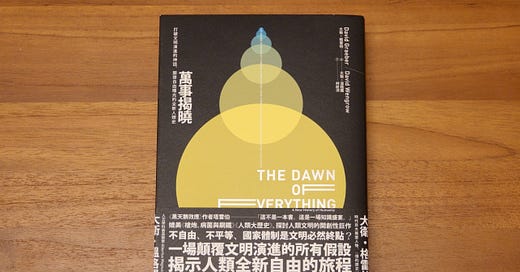My Translation of The Dawn of Everything Just Published!
My Chinese Translation of David Graeber and David Wengrow’s Masterpiece
Long time no see! It’s been quite a while since the last edition of the newsletter. I hope I will be able to write more in the second half of the year, as I have only two projects at hand now. Thank you again for your subscription and support, to both old friends and new ones :)
《翻譯鳥事一籮筐》是中英文雙語電子報。如果只想收到中文版,請到網站右上角的「My Account」內進行操作。有任何問題都歡迎來信聯絡,請直接回覆這封 E-mail 或寫信到 transcreation@substack.com。再次感謝你的訂閱支持!
這篇文章的中文版在這裡。
My Chinese translation of The Dawn of Everything was finally published last week! The translation of this masterpiece by David Graeber and David Wengrow took me nearly two years to complete. I submitted the work quite some time after the deadline, and had thus been stuck in this project throughout last year. Anyway, the translation manuscript was completed by the end of last year, and the book was finally published.
I was overwhelmed by the fame of the two authors, and was also much intrigued by the questions they asked (why the search for “the origin of inequality” missed the point; how did agriculture, states and cities came into existence?), so I took on the task happily. Only after then did I realize that I might be a little underqualified for tackling this masterpiece.
I jokingly told my friends that this book really covers the period from the Ice Age (literally) to the digital age (definitely a book that addresses contemporary issues), spanning three oceans and five continents, showing the authors’ ambition to rewrite human history. But the most amazing thing is that big as the questions are, and far-reaching as the time and space span is, the book always stays focused and never wanders into triviality. Each chapter, informative and interesting, answers the core questions one by one.
One of the passages that impressed me most is on how ancient people may not have wanted to domesticate wheat at all (pp. 229 to 233). Wheat has domesticated people, just as much as people domesticated wheat? Does it make sense to think about domestication from “the viewpoint of wheat”?
Yuval Harari … ask[s] us to think “for a moment about the Agricultural Revolution from the viewpoint of wheat.” Ten thousand years ago, he points out, wheat was just another form of wild grass, of no special significance; but within the space of a few millennia it was growing over large parts of the planet. How did it happen? The answer, according to Harari, is that wheat did it by manipulating Homo sapiens to its advantage. … If wheat didn’t like stones, humans had to clear them from their fields; if wheat didn’t want to share its space with other plants, people were obliged to labour under the hot sun weeding them out; if wheat craved water, people had to lug it from one place to another, and so on.
There’s something ineluctable about all this. But only if we accept the premise that it does in fact make sense to look at the whole process “from the viewpoint of wheat.” On reflection, why should we? Humans are very large-brained and intelligent primates and wheat is, well . . . a sort of grass. (P230)
And here is my Chinese translation:
尤瓦爾・哈拉瑞(Yuval Harari)……要我們「從小麥的角度思考一下農業革命」。哈拉瑞指出,一萬年前,小麥只不過是另一種野草,不是特別重要;但是不過短短幾千年,小麥的生長範圍已經幾乎遍布全球。小麥是怎麼辦到的?哈拉瑞認為,答案是小麥操縱智人為自己所用……如果小麥不喜歡石頭,人類就必須把田裡的石頭清掉;如果小麥不願意和其他植物分享空間,人類就不得不頂著豔陽工作,辛苦除草;如果小麥需要灌溉,人類就不得不從其他地方運水過來,諸如此類。
當中涉及了或多或少無可避免的趨勢,但前提是我們確實同意「從小麥的角度」觀察整個過程有其道理。停下來細想一下,我們真的該同意嗎?人類是腦容量非常大、非常聰明的靈長類動物,而小麥是……嗯……一種草。(頁 331)
This reflection as well as literature review is both insightful and humorous. As for why humans domesticated wheat so slowly? Just read Chapter Six of the book!
My biggest gain after translating this book, in addition to learning more on the entire history of the humanity all over the globe, is to truly appreciate the fact that the ancients (including those up to the Ice Age) were just as intelligent as us. I will continue to share more about my translation experience as well as interesting passages from the book. This book may seem thick at first glance, but the effort in translating and editing certainly makes the text fun and readable! Your purchase will be great support to the publisher :)




